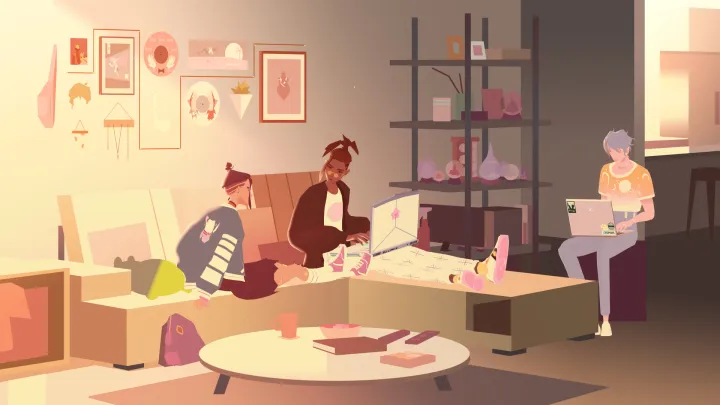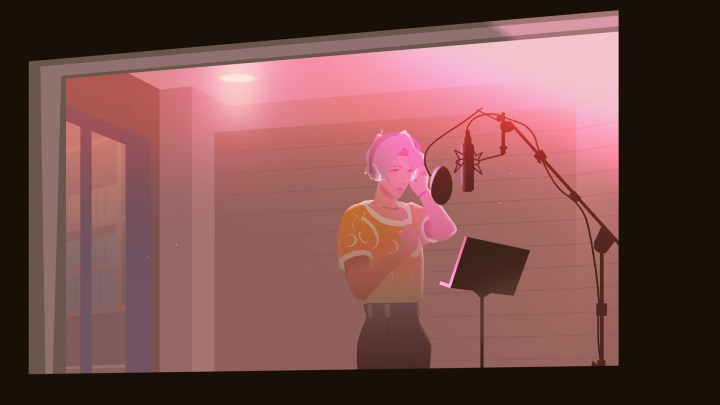If you’re someone who likes to keep up with what’s hot in the world of TV, 2022 is probably a nightmare. Between cable and streaming services, it feels like there’s 100 shows to binge at any given time, with various levels of time commitment attached to them. But is there room in your busy schedule for a narrative video game that mirrors the episodic nature of TV?
That’s a question that game developers have been experimenting with this summer thanks to two different releases. In July, we got the Xbox exclusive As Dusk Falls, a five-episode interactive motion comic about a hostage situation at a hotel. This week, we’re getting another episodic game in the form of We Are OFK. The stylish visual novel follows a fictional band as it tries to record its debut EP in-between day jobs and dating. Like As Dusk Falls, it unfolds in five episodes. But unlike that game, it’s not launching all at once. Instead, new episodes drop every week, just like a cable TV show.
It’s a creative concept and one that games are no strangers to thanks to studios like TellTale Games (and Valve, less successfully). But can a video game naturally fit into a TV structure? In an interview with Digital Trends, We Are OFK Director Teddy Dief shed some light on how the project came together and what other unique ideas are in the cards for the virtual band. Dief makes it clear that this is more than just a game; it’s your next favorite band.
Tune in
We Are OFK is a fascinating project. On its surface, it’s your standard visual novel. The five-part story tells the tale of a band coming together, focusing on each member’s personal journey. The interactive component is about what you’d expect from the genre, with players choosing dialogue options and text message responses. The added twist is that every episode features an interactive music video for one of the songs on the band’s EP. It’s a charming narrative that puts queer characters and stories front and center while delivering a set of genuine bops.
I’ve always wanted to get back to the TV medium … So I cheated and put it all in a game.
But what particularly makes the game fascinating is its release structure. When you buy the game at launch, you’ll get access to the first two episode. A new episode drops every week after that. For Dief (who is also the band’s lead vocalist), the decision to stagger the episodes came from a desire to capture the social energy of TV.
“I wanted to bring a feeling to games that I see in music and TV all the time — a new drop EVERY WEEK,” Dief tells Digital Trends. “This big moment where you get together with friends every weekend to see what happens next. Big watch party energy.”

That approach is clear in the final project. We Are OFK has about everything you’d want and expect from a TV show. Episodes are filled with interpersonal drama, as band members navigate their dead-end jobs and relationships. It’s easy to see how a fandom could form around it, with players drawing fan art and gossiping about who’s going to date who to kill time between releases. There’s a good reason the game is so effective at its episodic approach. Despite being known for games, Dief has a history with TV.
“I moved out to LA in the first place wanting to write for television, before I got into video games,” Dief says. “I’ve always wanted to get back to the TV medium, and even further back to my roots in music. So I cheated and put it all in a game. LOL. Everyone expected me to make another game after Hyper Light Drifter, so I just designed this band/TV/game hybrid, and if they want to think of it as a game, that’s cool.”
Clearing hurdles
To create the project, Dief would have to take an entirely different approach to how games are usually written. Working with co-writer Claire Jia (who previously worked on Fresh Off the Boat and Awkwafina Is Nora From Queens), the team originally built the episodes around a traditional sitcom format before eventually settling on more of a “one-hour dramedy” structure.
That episodic approach serves a dual purpose. For one, it allows episodes to give a spotlight to each member of the band. Additionally, it’s a clever marketing trick on the musical side. The very real virtual band at the heart of the project would get to drop their EP over the course of a few weeks, sustaining some long-term interest in the release — a difficult task that plenty of bands struggle with.
I’d love to share more story and windows into their lives. But the band needs to live a little first.
That didn’t come without some technical obstacles, though. Releasing a game app that would unlock new episodes every week required some creative workarounds.
“From a technical and logistics standpoint, there have been a lot of huge hurdles that our tech and porting teams have cleared,” Dief says. “On the Switch especially, we are hijacking a system that was never intended to be used like this, but Nintendo and PlayStation have both been super supportive!”
There’s another obstacle to an approach like this, but it’s more long-term: What happens if fans want a second season? Games can take much longer to develop than TV shows, so it wouldn’t be terribly realistic for the team to churn out a second set of episodes one year later like a standard TV show.

Dief isn’t concerned with that, though. While a second season isn’t off the table, it’s secondary to the actual next phase for the band. The goal is to introduce the band to reality next, having them tour and record more music. In that sense, the game isn’t exactly the focus here so much as the band it’s about.
“We created the game to be an introduction to this band of characters we love, that we are. Now they get to live,” Dief says. “We want OFK to tour, to play little shows around LA. They’re not trapped in the video game. That’s just how you meet them. Now … go joke with them on Twitter or duet them on TikTok or whatever. And yeah, I’d love to share more story and windows into their lives. But the band needs to live a little first.
“We Are OFK tells their story right up until present day — the release of their first EP. So we can’t tell more story until they’ve made some more music, played some shows, embarrassed themselves at a party. They’ve gotta have time to make stories we can tell!”
We Are OFK launches on August 18 for Nintendo Switch, PS4, PS5, and PC. Episode 1 and 2 are available at launch, with three more to follow on a weekly schedule.



